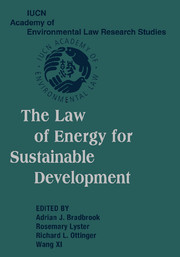Book contents
- Frontmatter
- Contents
- Acknowledgments
- Message from Kofi A. Annan, Secretary-General, United Nations
- Introduction – A Global Learned Society to Address Earth's Evolution: The IUCN Academy of Environmental Law
- Public Lectures on International Environmental Law
- PART ONE SUSTAINABLE DEVELOPMENT AND THE ROLE OF ENERGY LAW
- PART TWO LEGAL ISSUES IN CONTEMPORARY ENERGY LAW
- PART THREE INTERNATIONAL ENERGY LAW
- PART FOUR COMPARATIVE ENERGY LAW
- PART FIVE ELECTRICITY RESTRUCTURING
- PART SIX FINANCING FOR SUSTAINABLE ENERGY
- PART SEVEN CIVIL SOCIETY AND THE PROCEDURAL REQUIREMENTS OF ENERGY LAW FOR SUSTAINABLE DEVELOPMENT
- 30 The Role of Civil Society
- 31 Foundations in University Education
- 32 The Role of the Judiciary
- 33 Access to Justice and Citizen Enforcement
- 34 The Business Case and Approach to Sustainable Energy
- Index
30 - The Role of Civil Society
Published online by Cambridge University Press: 10 August 2009
- Frontmatter
- Contents
- Acknowledgments
- Message from Kofi A. Annan, Secretary-General, United Nations
- Introduction – A Global Learned Society to Address Earth's Evolution: The IUCN Academy of Environmental Law
- Public Lectures on International Environmental Law
- PART ONE SUSTAINABLE DEVELOPMENT AND THE ROLE OF ENERGY LAW
- PART TWO LEGAL ISSUES IN CONTEMPORARY ENERGY LAW
- PART THREE INTERNATIONAL ENERGY LAW
- PART FOUR COMPARATIVE ENERGY LAW
- PART FIVE ELECTRICITY RESTRUCTURING
- PART SIX FINANCING FOR SUSTAINABLE ENERGY
- PART SEVEN CIVIL SOCIETY AND THE PROCEDURAL REQUIREMENTS OF ENERGY LAW FOR SUSTAINABLE DEVELOPMENT
- 30 The Role of Civil Society
- 31 Foundations in University Education
- 32 The Role of the Judiciary
- 33 Access to Justice and Citizen Enforcement
- 34 The Business Case and Approach to Sustainable Energy
- Index
Summary
INTRODUCTION
The role of civil society is becoming a major aspect of international law. Nongovernmental organizations (NGOs) and individuals are becoming actors in international law in general and in international environmental law in particular. The environmental rights of citizens are being recognized on the international level (globally and regionally) and the national level. The role of citizens and NGOs in decision making is helping to prevent or mitigate adverse impacts on environment. Citizens' rights to access to information and public participation are prerequisites to the successful management of sustainable energy regimes.
Why is public participation important? Some governmental officials are likely to think that public participation is an unnecessary burden. It may appear to make decision making processes more complicated and time consuming. On the other hand, the public may suggest alternative solutions that will increase the quality of the decision and save resources and money. An improved decision may decrease or prevent negative impacts on the environment. Transparency of decision making also helps to avoid corruption. Since economically powerful private interests will always find a way to participate, even without legal provisions, allowing public participation can provide a counterbalance of forces, allowing well-intentioned civil servants to carry out their responsibilities free of outside pressure.
ENVIRONMENTAL RIGHTS IN INTERNATIONAL LAW
One of the foremost instances of civil society becoming active partners in important government decisions is in the field of environmental rights. These rights are being recognized at the global, regional, and national levels.
- Type
- Chapter
- Information
- The Law of Energy for Sustainable Development , pp. 521 - 539Publisher: Cambridge University PressPrint publication year: 2005
- 1
- Cited by

